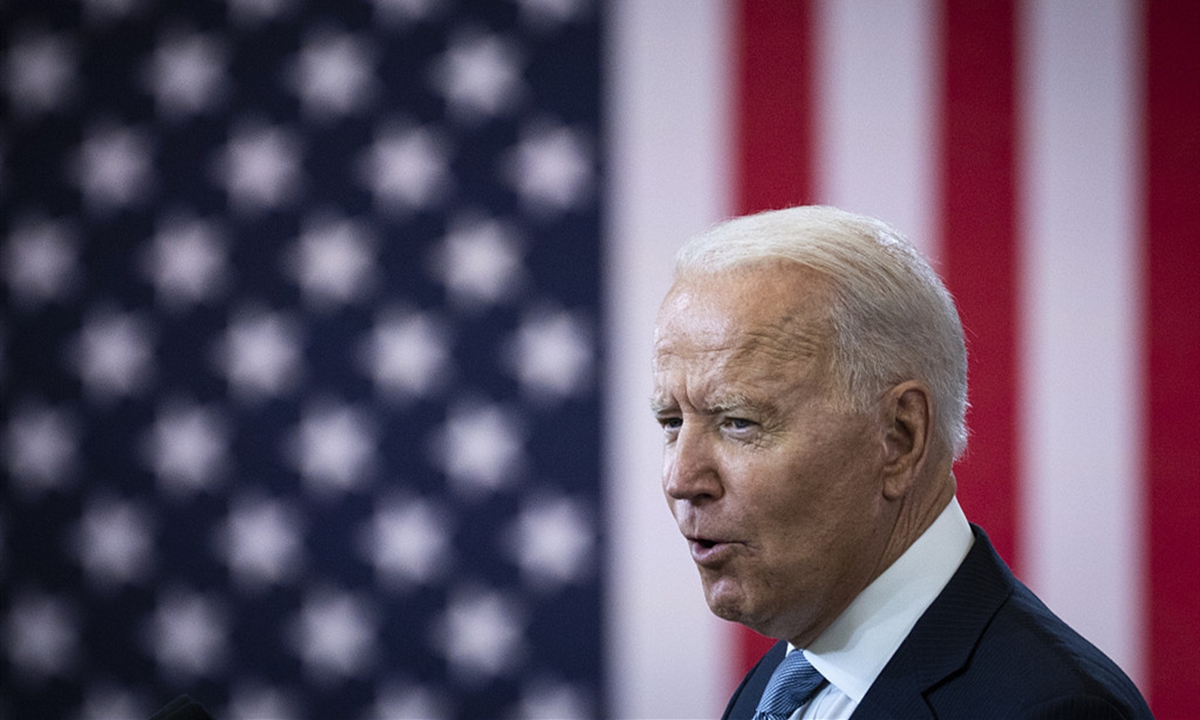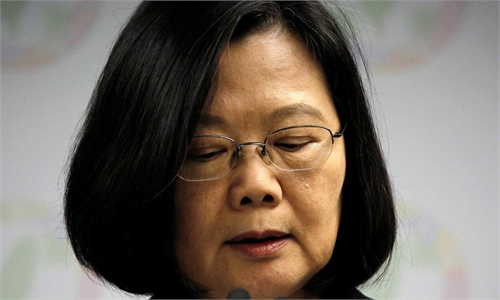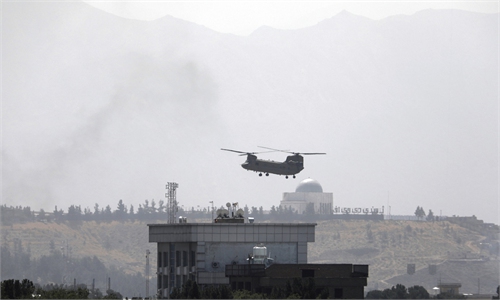Is Biden remark on defending Taiwan muddle-headed or face-saving – China’s military despises it: Global Times editorial

Biden Photo: VCG
In an interview with ABC News on Wednesday, responding to questions about whether "the US cannot be trusted," US President Joe Biden said: "We made a sacred commitment to Article 5 that if in fact anyone were to invade or take action against our NATO allies, we would respond. Same with Japan, same with South Korea, same with - Taiwan. It's not even comparable to [Afghanistan to] talk about that."
Linking Article 5 of the NATO charter with Taiwan? This is something any US official hadn't made before. US scholars quickly suspected that Biden had misspoken. A senior Biden administration official told Reuters on Thursday that US "policy with regard to Taiwan has not changed." State Department spokesperson Ned Price also drew official statements concerning the island of Taiwan back to normal at a press briefing Thursday. Most of the Western media outlets reported what US officials said to fix Biden's deviated remarks.
The Taiwan authorities thanked Biden, but are vigilant toward whether the casual remarks by Biden portend a US Taiwan policy adjustment. In general, they have no guts to overly consume or exaggerate what Biden said.
International public opinion suspect if Biden was "muddle-headed" when uttering his words or whether he said so to get rid of the embarrassment he is facing over the Afghanistan debacle. Generally speaking, if there are major policy adjustments in the US, anonymous officials or relatively low-level officials will leak certain information first, then think tanks and public opinion will follow to hype it. It's not in line with US political tradition that a provocative policy is first released by the president in a media interview. It's also incompatible with the Biden administration's performance since it took office.
Biden lost face because of the Afghanistan situation. He is being fiercely attacked by US public opinion and also reprimanded by the public opinion of his allies. Now is the most difficult moment since he took office. He was so eager to save face. This is not only a matter of his personal reputation and approval rating, but also will have a direct impact on the Democratic party in the midterm elections next year.
No matter the reasons why Biden made such a remark, it must be pointed out that it's empty talk without any real strategic determination and military preparation. In view of the US' helter-skelter evacuation from Afghanistan, neither Biden nor the US government has the credibility to convince the outside world they have the will and capability to push a policy that could quickly lead to a showdown with China in the Taiwan Straits.
Article 5 of the NATO charter should only apply to NATO members. There is no alliance treaty between the island of Taiwan and the US and NATO. All NATO countries including the US only have "unofficial relations" with the island. Will those NATO members agree to share the military obligations of "defending Taiwan" with the US? No wonder many people doubt if Biden really knew what he was saying when he referred to the Article 5 to talk about the US' commitment to Taiwan.
China will never accept Biden's threat. China's strong military capabilities and national resolve despise what he said. The US has long maintained "strategic ambiguity" over the Taiwan question. This includes not having clarified whether the US will send troops in the event of a war in the Taiwan Straits. Not only the US, the Chinese mainland has also maintained a certain degree of "strategic ambiguity," so has Taiwan island. For instance, we have stated China must be reunited, but haven't announced a timetable or the methods. If Washington declares it will militarily "defend Taiwan" - a break of the status quo in the Taiwan Straits - the mainland will definitely make strategic adjustments across the Taiwan Straits, and the Taiwan Straits will enter a new era of unprecedented high-intensity gaming.
We would like to ask: Is Biden ready for this? Is the ruling team he leads ready? Is the US military power in the West Pacific big enough to deal with the incoming waves? Have they ever assessed how many US soldiers will die if a war breaks out? Have they ever thought about what it means for the US to fight a battle with a nuclear power over the other side's core interests?
An interesting question is: If all concerned parties give up "strategic ambiguity" and let the Taiwan Straits situation develop in a free fall, which side, the mainland, US, or the Taiwan island, will be the first one that cannot withstand it?
We want to warn secessionists on Taiwan island: Don't swim in the sputum Biden carelessly spits out. The US won't "defend" Taiwan; what it is interested in is encouraging the island to confront the mainland and use Taiwan to contain the mainland's development. What Washington wants is "Taiwan fights for itself," or more exactly, "Taiwan fights for the US." If Taiwan authorities lose their mind to cross the red line of the Anti-Secession Law at the instigation of the US, they will surely be sacrificed for US strategic interests and head for destruction.



